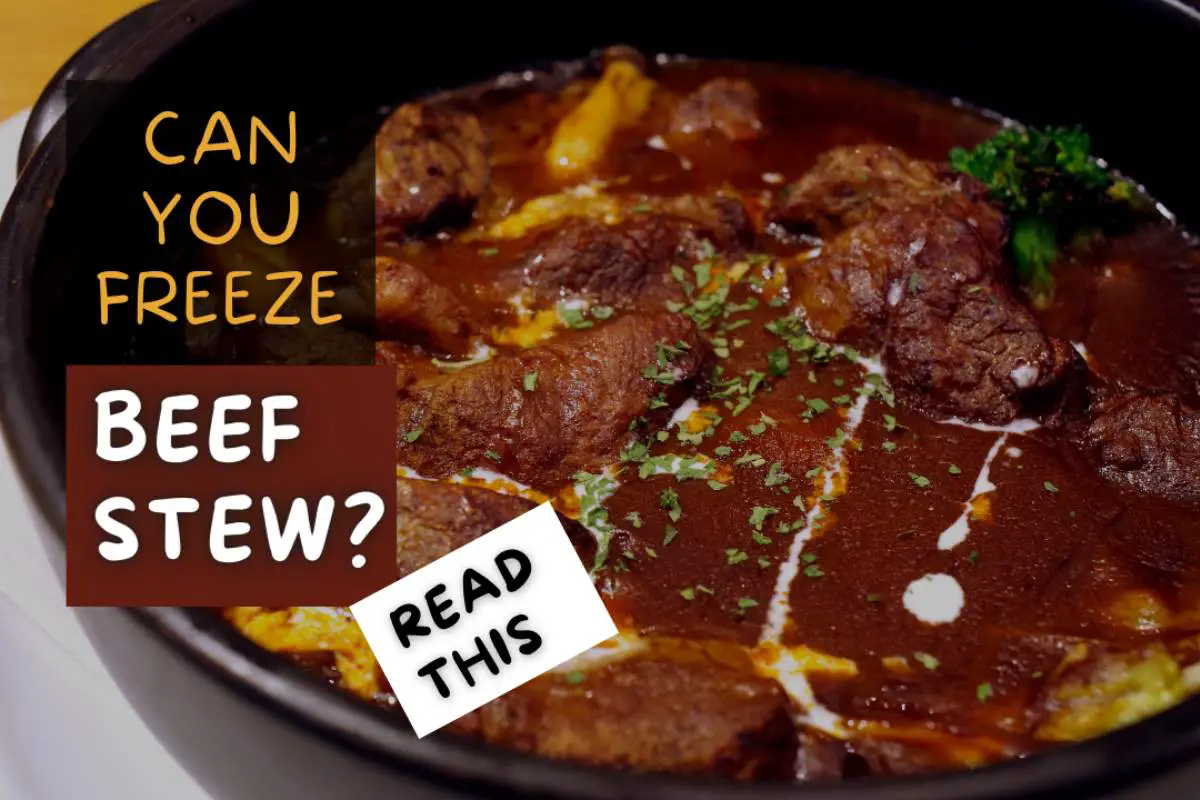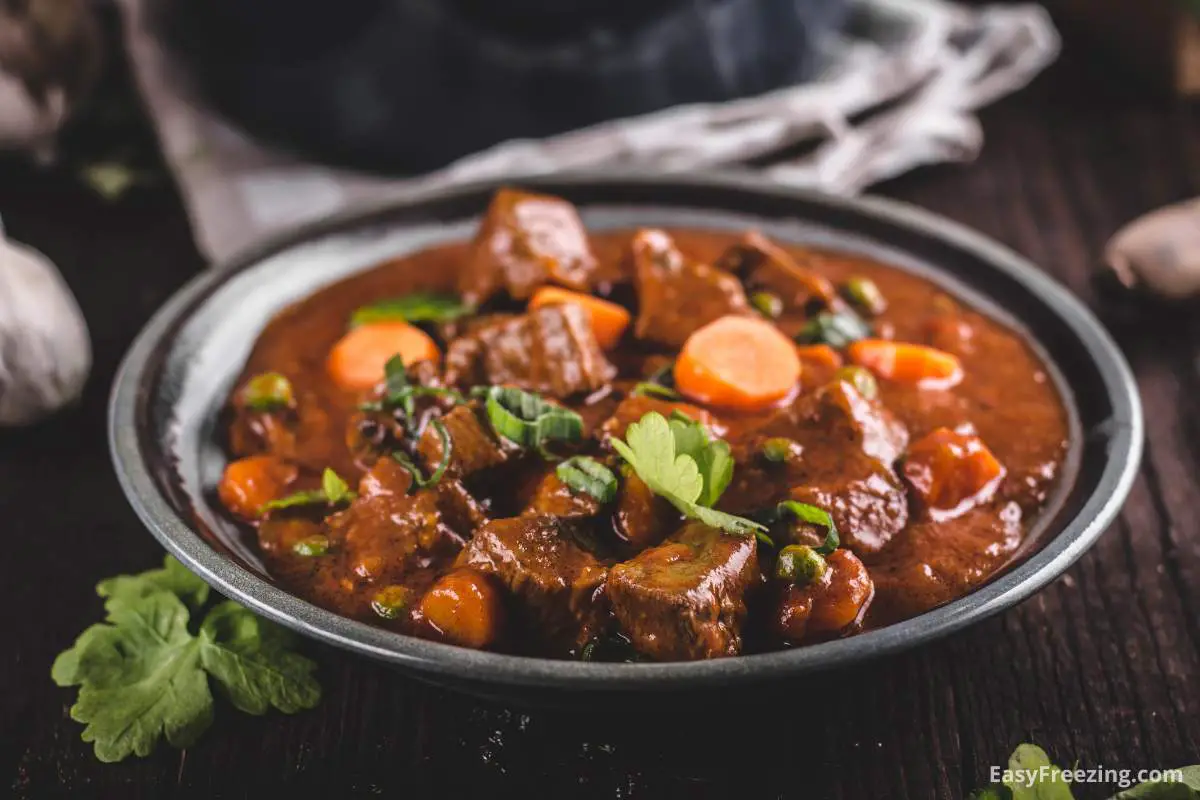Can You Freeze Beef Stew? (Read This!)
Yes, it is entirely possible to freeze beef stew. Freezing keeps the beef stew fresh and ready to use at any time.
Freezing beef stew is actually quite easy, just put it in a plastic container and then in the freezer.
The cooking method, however, has a big impact on whether or not your stew preserves its original flavor (if the ingredients were allowed to mix properly, if it contained the right mixture of vegetables and other spices, or if it was frozen longer than expected.)

What Exactly Is A Beef Stew?
Beef stew is a fully cooked combination of beef, beef broth, and vegetables. The beef is cooked until it is soft, then vegetables such as carrots, onions, raw or cooked potatoes, and celery are added.
It’s a wonderful comfort food and goes well with various side dishes, including rice, bread, and mashed or fried potatoes.
When preparing a delicious beef stew, you’ll want to simmer it for a time with your vegetables. You may also use a slow cooker for cooking the stew for a substantial period, giving it a superb taste and deep flavor.
To thicken the stew, add a flour mixture to the simmering stew while it is cooking, or use potatoes, but keep in mind that potatoes become soft, lose their texture, and do not freeze well.
Pro Tip: If you’re making a pot of beef stew to freeze, it is best to add the potatoes after removing it from the freezer when reheating the stew.

Tips On How To Store And Reheat Your Beef Stew
Beef stew is a full meal that may be used in various ways and can be frozen and reheated easily. Storing your beef stew in the refrigerator overnight or freezing it is the best way to prevent bacterial growth, and keeping it frozen will save you time on days when you don’t have the time to start cooking from scratch.
Below are some basic things to know in order to keep the stew fresh, tasty, and ready for reheating.
- Allow the stew to cool. Divide the beef stew into airtight containers to keep it fresh, and freeze it for as long as you like.
- Defrost the frozen beef stew slowly and carefully (overnight in the fridge is ideal). Beef stews, like most other stews, freeze well.
- Proceed to reheat the stew in the microwave or on the stovetop before serving. For maximum freshness, add spices and more vegetables to the stew when reheating.
How To Freeze Beef Stew
Knowing that your beef stew may be safely stored in the freezer after considering the time and effort it took to prepare it is a welcome relief.
When you freeze beef stew, there are a few things to remember.
1. Cool Beef Stew Down Completly Before Freezing

Allow the beef stew to cool for about 30 minutes before packaging it. Before placing it in a freezer bag or container, allow it to cool to room temperature. You can also cool the stew in an ice bath if you’re in a hurry.
To prevent bacteria from forming, don’t leave it at room temperature for an extended period. Ensuring your beef stew is cooled completely before freezing it prevents freezer burn.
2. Freeze Beef Stew in Airtight Containers
To keep your beef stew in the right condition for long-term storage, place it in a plastic freezer-safe container. Be sure the container has been thoroughly cleaned before use.
Select the appropriate container size. You’ll want to fill up your container as much as possible while still leaving some room at the top for the stew to expand as it freezes.
Avoid using an overly large container as an underfilled storage container will have a lot of excess air inside that can cause freezer burn.
Label your containers as you arrange them in your freezer.
3. Add Your Beef Stew To The Freezer
After cooling and putting the stew into containers, you can place your labeled containers in the freezer for storage. Your beef stew freezes well, so you should be confident that it will keep its deep flavor for some months.
You may keep your beef stew in the freezer for up to three months, and it will be ready to eat when you take it out.
Now, you can see how simple it is to store beef stew.
Precautionary Measures To Take When Freezing Beef Stew
There are a few steps to guarantee a fresh beef stew during freezing.
First, make sure the stew is completely cooked before freezing it. Before packaging, thoroughly cook the spices and beef. Potatoes should be avoided (and can be added when reheating later) since they alter the texture of the meat stew.
Allow the stew to cool before packaging. Label and divide into containers or freezer bags. To avoid freezer burn, remove any air pockets and store them appropriately.
How To Defrost Or Thaw Beef Stew
It is simple to create a delicious beef stew by following a recipe, and it is also simple to freeze. There are a few straightforward methods for thawing frozen beef stew that have proven to be highly efficient.
One of the simplest methods for thawing frozen beef stew is to place it in the fridge overnight. It is a long process, but it is also safe and will ensure that the best flavor and texture is preserved.
Another option is to place your frozen stew directly in your microwave or saucepan. This method is quite effective, as well, especially if you need your beef stew as quickly as possible.
You can also thaw frozen beef stew by placing the container of frozen beef stew in a bowl of cool water. This will expedite the thawing of the beef stew. You may then place it in the microwave or pan and cook it on low heat. Stir in some newly cooked vegetables to freshen the taste.
Frequently Asked Questions
Do Potatoes In Beef Stew Freeze Well?
Potatoes in beef stews do not freeze well. Experts say that you shouldn’t cook your stew with potatoes, and if you do want to add them, you should do so when reheating. Alternatively, you can add dry potato flakes when the stew is ready to serve.
Can You Refreeze Beef Stew?
You should not refreeze beef stew once it has been frozen, thawed, and reheated, so be sure only to defrost the amount you will eat. Placing a large beef stew recipe into smaller containers to freeze will help with portioning.
Can You Freeze Beef Stew – Final Thoughts
If you follow the instructions in this article, you can freeze your cooked beef stew for several months without fear of it losing its texture, taste, or rich flavor.
Be sure to follow the correct procedures when freezing beef stew and when it comes to reheating the right amount, just as you would with any frozen food.






